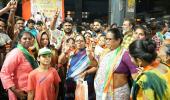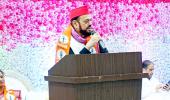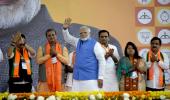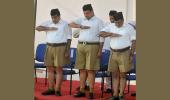Can only a Muslim best represent Muslims?
Will Hindus not vote for a Muslim candidate?
Is that why such few Muslims are given tickets?
Two constituencies in Mumbai break prevalent stereotypes about these difficult questions.
Jyoti Punwani reports.

In Bandra West, where Muslims make up a little more than a quarter of the electorate (25.3%), the Bharatiya Janata Party's Ashish Shelar is being preferred by some in the community over his rival Asif Zakaria of the Congress. Shelar had defeated Zakaria in 2019.
Interestingly, in the Lok Sabha polls held just six months ago, Muslims of this constituency had, like their counterparts across Maharashtra, helped defeat the BJP by voting for the INDIA alliance's Varsha Gaekwad.
Despite Gaekwad being new to the area, the 4-time Congress MLA from Dharavi defeated the BJP's high profile candidate, former public prosecutor Ujwal Nikam by 16,514 votes.
However, her party colleague now standing opposite Shelar may not get the same support from Muslims, despite being a Muslim himself.
A three-time corporator from the area, Zakaria inherits the legacy of his father, the late Congress MLA Ahmed Zakaria.
In addition, he is the candidate of the Maha Vikas Aghadi (MVA, the Uddhav Sena-Congress-Sharad Pawar NCP alliance), which enjoys the support of most Muslims.

Despite these advantages, it was reported that Zakaria had to be persuaded to stand.
The reason may lie in Shelar's popularity -- in 2019, he received 57% of the vote, up from 51% in 2014, when the Modi wave was at its peak. Zakaria received only 37%.
Shelar's unique appeal lies in his focus on resolving local issues affecting Muslims.
These were issues that could not have been resolved by the community on its own, not only because authorities rarely listen to those directly impacted by their decisions, but even more because BJP governments rarely listen to Muslims.
Yet, Shelar managed to get the railways and the MMRDA, an agency accountable only to the chief minister, to change their designs for infrastructural projects so that the only Muslim graveyard available to Sunnis in the area, and the 220-year-old landmark Jama Masjid, were not adversely affected.

Auto owner-driver Fahim Qureshi was more than willing to talk about why he supported Shelar.
That the MLA financed the purchase of his new auto meant as much to him as what Shelar did for Qureshi's kinsmen -- got them a brand new direct train to their hometown Moradabad, a long-standing demand ignored by other politicians.
The train, that currently runs only once a week, was inaugurated in October.
It's obvious that Shelar can get such crucial work done only because of his political clout -- he is the ruling party's city president. However, how many BJP bigwigs help Muslims, specially when it comes to matters concerning mosques and graveyards?

What makes Shelar do so?
It may have something to do with the 52 year old having grown up among Muslims in Bandra.
At a rally held last week behind Bandra's famous Lucky restaurant, Shelar spoke of how he crossed the very lane where the rally was being held to go to school, how he played cricket there.
Qureshi has known Shelar since the latter went to college, joined the ABVP (the BJP's student wing), and then entered politics.
All through, said Qureshi, their relationship didn't change. "When I'm desperate, he's the person I can turn to for help."
No fan of the BJP, Qureshi had no hesitation in saying that he and his family would vote for Shelar. "I'm no namak haram," he added.
***
Seated in the office of the Bandra Urdu High School adjacent to the Bandra mosque, Zameer Ali Shaikh, trustee, Bombay and Bandra Bakkar Kasai Jamat Mosques Trust which runs both the school and the mosque, spoke of how Shelar's interventions had helped get essential approvals, held up for months by the BMC, for the trust's English school and the community's jamatkhana.
As we spoke, Prime Minister Narendra D Modi was holding his last campaign rally in Shivaji Park.
All the candidates of the BJP and the Shinde Sena were in attendance with their supporters. Why had Zameer not gone?
"I've nothing to do with the BJP; I'm a Shelar supporter," shot back Zameer.
"People tell me to worry about my imaan (religious belief). Well, my imaan lies in voting for the man who has done so much for our community."
In exchange, these Muslims are willing to ignore Shelar's recent utterances on 'vote jihad' as arising out of political compulsions.

But not all Muslims feel similarly obliged. Advocate Adil Khatri was as agitated as the average Muslim about the impact of the railways' plans on the community's graveyard. However, though Shelar resolved that issue, Khatri points to the increase in hate speech and attacks on Muslims under the new government.
"Ashish Shelar, despite holding a powerful position, stood as a mute spectator," said the young lawyer.
Tellingly, the Muslim women who occupied all the chairs at last week's rally couldn't say why they supported Shelar.
When probed, one of them smiled and admitted that they'd been brought to the rally, paid Rs 300 each.
***

Not too far away, the Versova constituency presents a contrasting scenario. This is where the only Muslim to get a ticket from Uddhav Thackeray is standing for election.
Muslims make up more than a third of the electorate here (33.5%), and with their fondness for the Sena chief, Haroon Khan may be assured of the majority of the community's vote, except for those swayed by the AIMIM's appeal. The AIMIM's city president, builder Raees Lashkariya, is contesting the election from Versova.
But what of the Hindus?
Dilip Meghwal, who has worked for every political party in the area, is sceptical.
This was one of the seats the Congress had wanted, and the name of its mahila morcha chief, Bhavna Jain, had been doing the rounds.
"Jain would have got the vote of all communities," said Dilip. "Now Hindus won't vote for Haroon Khan. They'll go for the BJP's Bharti Lavekar."
One section of Hindus seem ready to prove this prediction wrong: The Uddhav Sena's Shiv Sainiks, and not only because they are used to obeying whatever aadesh comes from Matoshree, where the Shiv Sena (UBT) chief lives.
Khan carries a weightier stamp of approval: "Balasaheb himself had appointed him shakha pramukh," says Meenakshi Kale, campaigning for the Muslim who has been in the Sena for the last 35 years.
It was his standing as a shakha pramukh that got his wife Shaheda a ticket for the 2017 municipal elections. Since the ward was reserved for women, Khan couldn't fight, but locals credit him for the work done during his wife's tenure, listing toilets, pucca road and temples.

Dr Ravindra Yadav, who practises in the area, recounts an interesting story. Khan's name was recommended as trustee of a new temple in the area.
When the BJP objected to a Muslim being inducted in the running of a temple, Khan recited Sanskrit shlokas and quoted the Mahabharat to prove that he was fit for the post.
He didn't get it, but even BJP supporters can't fault him for being a Muslim.
Khan refuses to describe himself as a "Muslim candidate". "I'm just a Shiv Sainik," he says.
In fact, on the campaign trail, it is difficult to make out Khan from a typical Shiv Sainik. Tika on forehead, he waits patiently while women perform aarti for him.
As the campaign was drawing to an end, he performed aarti in a temple, following the priest's instructions.
Will all this help? Or will Versova confirm the stereotype that in 'New India', Hindus won't vote for Muslims?
Feature Presentation: Rajesh Alva/Rediff.com











 © 2025
© 2025